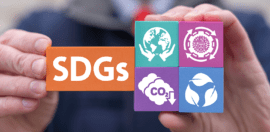ESG focus propelling KPMG sustainability success

12 September 2022 at 5:55 pm
KPMG Australia is reaching its sustainability and social responsibility goals, according to its latest impact report. So how is it getting the issues over the line?
KPMG Australia has achieved 100 per cent renewable energy usage at its Australian offices, improved its internal gender pay gap by 2.3 per cent and created a work-from-anywhere policy so employees can spend time with family members abroad, its most recent impact report reveals.
Reporting on its achievements in the ESG space over the past 12 months the Our Impact Report 2022 also highlights a new 26 week paternity leave policy with 20 per cent more men using it in the past 12 months.
In a joint statement from KPMG Australia national chairman Alison Kitchen and KPMG Australia CEO Andrew Yates said they “wanted to demonstrate [their] intention to grow with purpose”.
“We were clear, however, that our ambitions would only be meaningful if we were conscientious about evaluating our progress consistently and transparently,” they said in the Our Impact Report 2022.
“We’re proud of the social and environmental impact we’re achieving, alongside improvement to our governance and leadership on Environmental, Social and Governance (ESG) issues.
“We’ve made real progress against key commitments, including reducing environmental harm, improving the experience of our people, further strengthening our economic contributions, and applying a research-informed perspective to our governance and understanding of trust,” they said.
Managing the mechanics of a robust corporate governance policy
Eleven topic areas were chosen for their importance “to internal and external stakeholders” filed under pillars of either planet, people, prosperity, and governance.
The report was prepared in accordance with the WEF IBC Stakeholder Capitalism
Metrics and with reference to the Global Reporting Initiative (GRI) Standards.
Acting head of corporate citizenship for KPMG Australia Rita Fentener van Vlissingen said the past 12 months have seen KPMG Australia focus on ESG.
“From climate, to reconciliation, to human rights, to lifelong learning, and this brings our purpose to life.
“When talking about having an impact on humanity we can give real world examples of how we are making a difference,” she said.
Fentener van Vlissingen manages a dedicated team making sure the impact goals are being actively implemented.
“Our climate action plan was launched in 2018 and we are now working on a new one toward 2030.
“We are contributing to the conversation, reducing the carbon footprint to net zero. We know the wind farm where the energy is coming from.
“It is one thing to be certified carbon neutral but another thing to let your people know how it is made possible,” she said.
She said engagement with the staff is a big part of the work she does.
“The work we are doing can then translate to employees’ homes as well as at work,” she said.
“This engagement translates with how our staff can then share that with their clients,” she added.
Fentener van Vlissingen said life-long learning is another ESG focus as well as the appointment of a human rights manager within KPMG.
KPMG Australia’s human rights manager Andrew Small has crafted updated modern slavery statements for the company.
“We also have a pro bono program to help not for profits and social enterprises to promote how we contribute to having conversations about things that matter,” she said.
“At KPMG we have quite a broad range of talent. From responsible business, to audits there is quite a lot we can do to help not for profits,” she added.
Fentener van Vlissingen said that for smaller businesses who cannot afford to have a team dedicated to implementing a large-scale ESG strategy, she suggests you can always have impact.
“I would start by thinking about what inspires you. Think about the issues around ESG that mean something to you or your stakeholders and go from there.
“I would also suggest using the Global Goals as a starting point to building your strategy,” she suggested.
“We use all 17 of them. They are really helpful in helping you articulate your businesses’ different priorities.”







